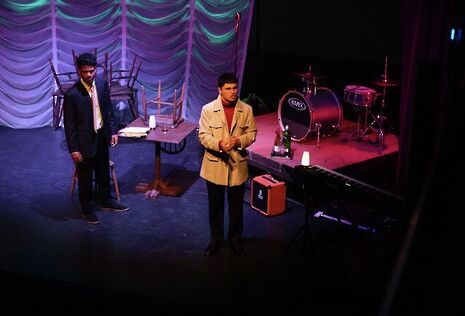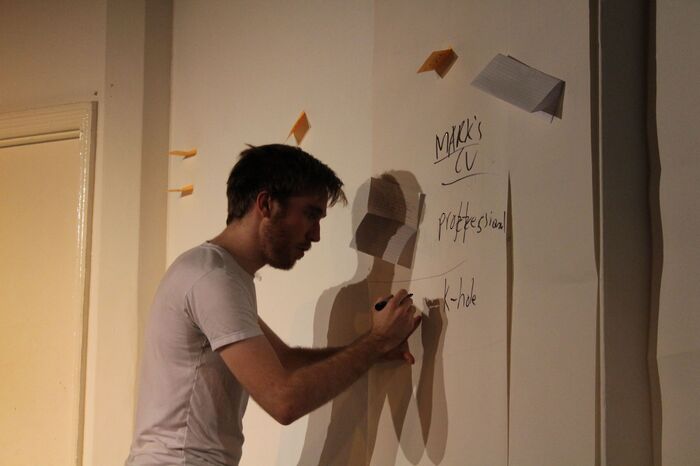ETG 2018: Othello review
Joy Gingell’s 1960s jazz-inspired Othello is a fresh approach both enjoyable and inventive, even if it drags in parts

"‘O, beware, my lord, of jealousy; / It is the green-eyed monster which doth mock / The meat it feeds on’. So ironically – and famously - warns the scheming Iago in Shakespeare’s Othello. And while this much quoted speech might be famous for good reason, touching as it does on so many of the tragedy’s motifs from false counsel to colour, it also serves as a reminder of what some might deem the play’s enduring over-popularity. As with any favourite Shakespearean tragedy, coming up with a fresh approach to Othello can be a challenge for student directors. But, on the whole, I found Joy Gingell’s take on the tragedy of ‘one that loved not wisely but too well’both well thought-through and enjoyably inventive.
"As with any favourite Shakespearean tragedy, coming up with a fresh approach to Othello can be a challenge for student directors."
Gingell’s version transposes the Renaissance tragedy to the swinging sixties, centring on the London jazz scene. As a stand-in for the relatively cosmopolitan Venice, the sixties’ jazz scene works well as cultural moment which seems to represent the breakdown of traditional attitudes towards both race and gender, and the use of a live band to score moments in the show lends the performance an infectious energy. One especially clever twist was the decision to expand on Othello’s comment that Desdemona is an ‘admirable musician’ and to have Desdemona (Ella Blackburn) open the show with a jazz rendition of the ultimately haunting ‘Willow Song’.
Blackburn’s Desdemona struck a good balance between sweetness and strength, enough to prove utterly sympathetic without appearing to be overly delicate, which is always something of a risk with a character who gives so much deference to an abusive husband. She was well-matched by the warmth of Jordan Julien’s Othello, who made for a convincingly charismatic leader. What felt less convincing was his sudden and explosive transition from security to jealousy. Once again, this is a risk actors always seem to run and of course is perhaps more of a directorial choice, but I for one felt that this build could afford to have been played out a little more gradually to really create the impression that Othello had resigned himself to the falsehood. Becky Shepherdson’s Emilia gained momentum as she went along, shining in her darkly comic proto-feminist speech towards the play’s conclusion. In particular, the interaction between her and Bilal Hasna’s Iago was a strong-point, with the moment she unsuccessfully attempts to recreate an affectionate gesture just acted out by Othello and Desdemona as an especially poignant moment. But Hasna’s Iago is the real star of the production, managing to be at once ceaselessly watchable and carefully controlled at any given moment. As an added bonus, his was easily the clearest diction – an issue which some of the cast struggled with in more heated moments.
As a touring production, the show’s design is relatively simple but was generally very effective. Production Designer Zak Karimjee’s costume design was pleasantly nostalgic in its use of 1960s-inspired fashion, and also managed to generate some real resonance; Desdemona’s green pyjamas in the final sequence was a nice touch. The strongest element of production design, however, was the use of the gauze backdrop as a part of the set. Patterned with 1960s-appropriate waves in the fabric and lit from within, this ultimately formed the canopy of Othello and Desdemona’s bed. In the final scene between the two, Karimjee was able to create a striking stage picture: the canopy aglow with an almost divine light, framing the sleeping Desdemona as an almost angelic figure with Othello behind as a tortured silhouette.
That being said, there were areas in which the production could stand to improve; my main issue was its pacing. While the text itself is lengthy and on the whole was cut sensibly, it was still a long evening and at times the cast didn’t entirely manage to create enough of a sense of energy to keep the plot moving. At others, for instance at the end of the first half, it felt that the desire to indulge in another - albeit enjoyable – jazz sequence was interfering with the pacing of the plot. Considering that the show has already enjoyed an international run significantly longer than the average Cambridge one, it was frustrating to feel that there was still some significant ironing out to do in places.
Overall, however, this is an engaging and well-constructed evening of Shakespeare, with a setting that works and with a surprising number of humorous moments. Lively and smart, Gingell’s production certainly does the tragedy justice.
 News / Judge Business School advisor resigns over Epstein and Andrew links18 February 2026
News / Judge Business School advisor resigns over Epstein and Andrew links18 February 2026 News / Gov grants £36m to Cambridge supercomputer17 February 2026
News / Gov grants £36m to Cambridge supercomputer17 February 2026 News / CUCA members attend Reform rally in London20 February 2026
News / CUCA members attend Reform rally in London20 February 2026 News / Union speakers condemn ‘hateful’ Katie Hopkins speech14 February 2026
News / Union speakers condemn ‘hateful’ Katie Hopkins speech14 February 2026 News / Hundreds of Cambridge academics demand vote on fate of vet course20 February 2026
News / Hundreds of Cambridge academics demand vote on fate of vet course20 February 2026










